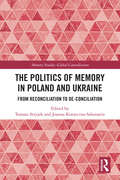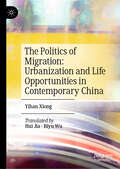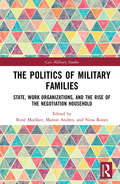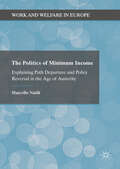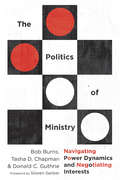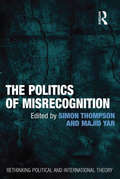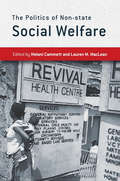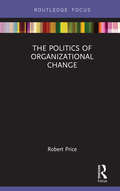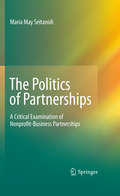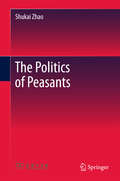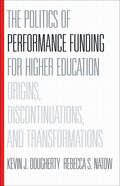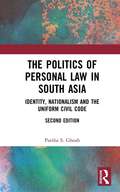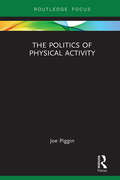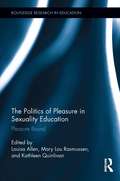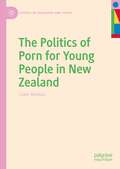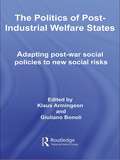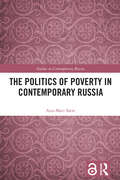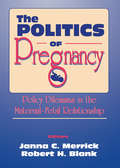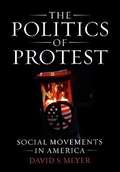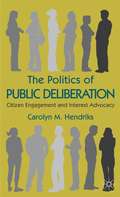- Table View
- List View
The Politics of Memory in Poland and Ukraine: From Reconciliation to De-Conciliation (Memory Studies: Global Constellations)
by Joanna Konieczna-Sałamatin Tomasz Stryjek Volodymyr SklokinBringing together the work of sociologists, historians, and political scientists, this book explores the increasing importance of the politics of memory in central and eastern European states since the end of communism, with a particular focus on relations between Ukraine and Poland. Through studies of the representation of the past and the creation of memory in education, mass media, and on a local level, it examines the responses of Polish and Ukrainian authorities and public institutions to questions surrounding historical issues between the two nations. At a time of growing renationalization in domestic politics in the region, brought about by challenges connected with migration and fear of Russian military activity, this volume asks whether international cooperation and the stability of democracy are under threat. An exploration of the changes in national historical culture, The Politics of Memory in Poland and Ukraine will appeal to scholars with interests in memory studies, national identity, and the implications of memory-making for contemporary relations between states.
The Politics of Migration: Urbanization and Life Opportunities in Contemporary China
by Yihan XiongBased on extensive fieldwork and longitudinal studies, this book posits that the household registration (hukou) system is a fundamental institutional arrangement in contemporary China. It employs the theoretical framework of local citizenship to analyze the rights and conditions of the migrant population amidst urbanization. Local citizenship functions as both a governance classification and a qualification for access to public resources, influencing not only migration patterns but also the social mobility of various migrant classes. Importantly, the widely discussed education policies for migrant children are part of a broader framework of national migrant management and local industrial policies.
The Politics of Military Families: State, Work Organizations, and the Rise of the Negotiation Household (Cass Military Studies)
by Manon Andres René Moelker Nina RonesThis book examines the politics of military families in relation to the tensions between the state, military organization, and private life. It elaborates on the tensions between the advent of challenging worldwide deployment for the military and the prominence of the home front. The volume aims to understand the dynamics of conflict and change within triad figurations at the macro (society), meso (organizational), and micro (family) level and is guided by the following overarching research questions: What are the key issues in the three-party dynamics? What tensions exist in these dynamics? How do actors seek to arrive at a balance? What initiatives for change are made? With contributions from international scholars, who examine the workings of politics in military families at all three levels, the book argues that members within military families deal with shifting power balances and these are impacted by demands from organizations and the state. This book will be of much interest to students of military studies, sociology, organizational studies and politics.
The Politics of Minimum Income: Explaining Path Departure And Policy Reversal In The Age Of Austerity (Work And Welfare In Europe Ser.)
by Marcello NatiliMinimum income schemes (MIS) have become key social protection institutions for European citizens, but we know little regarding the logic and dynamics of institutional change in this policy field. This book provides an analytical model that will facilitate an understanding of the scope and direction of recent reforms, offering insight into the conditions under which minimum income schemes are introduced, expanded or retrenched. Natili presents a comparative analysis of policy trajectories of minimum income schemes in Italy and Spain between the mid-1980s and 2015. Although these two countries had similar points of departure, and faced comparable functional pressures and institutional constraints, they experienced remarkably different developments in this policy field in the last two decades. This comparative analysis provides empirical evidence of the impacts of different types of credit-claiming dynamics resulting from the interaction of socio-political demand with political supply. The Politics of Minimum Income also assesses the reform processes both in countries that have introduced MIS in the age of austerity (such as Portugal) and in countries that have retrenched them (Austria and Denmark).
The Politics of Ministry: Navigating Power Dynamics and Negotiating Interests
by Steven Garber Bob Burns Tasha D. Chapman Donald C. GuthrieWe all need help navigating the politics of ministry. "Politics" is often considered a dirty word. It brings to mind lies and manipulation, accusations and scandals. But at its most basic level, politics is simply the everyday activity of getting things done with other people: understanding their interests, recognizing the power dynamics at play, and learning how to negotiate relationships and institutions to achieve a common goal. These realities are as true in ministry settings as anywhere else. In The Politics of Ministry, Bob Burns, Tasha Chapman, and Donald Guthrie combine their long ministry experience with sociological research on the topic. Filled with real-life stories taken from a variety of ministry settings, this book sets out wise principles and practices that help us see more clearly the political dynamics at play in our churches and parachurch ministries. All ministry is political. As servants of Christ's kingdom, we are called to navigate the politics of ministry with grace, wisdom, and charity. This book shows us how the gospel of Jesus changes the way we work with those around us toward our common goal.
The Politics of Misrecognition (Rethinking Political and International Theory)
by Majid YarThe past several decades have seen the emergence of a vigorous ongoing debate about the 'politics of recognition'. The initial impetus was provided by the reflections of Charles Taylor and others about the rights to cultural recognition of historically marginalized groups in Western societies. Since then, the parameters of the debate have considerably broadened. However, while debates about the politics of recognition have yielded significant theoretical insights into recognition, its logical and necessary counterpart, misrecognition, has been relatively neglected. 'The Politics of Misrecognition' is the most meticulous reflection to date on the importance of misrecognition for the understandings of our political and personal experience. A team of leading experts from a range of disciplines, including philosophy, political theory, sociology, psychoanalysis, history, moral economy and criminology present different theoretical frameworks in which the politics of misrecognition may be understood. They apply these frameworks to a wide variety of contexts, including those of class identity, disability, slavery, criminal victimization and domestic abuse. In this way, the book provides an essential resource for anyone interested in the dynamics of misrecognition and their implications for the development of political and social theory.
The Politics of Museums (New Directions in Cultural Policy Research)
by Clive GrayThis is the first book to examine how and why museums are political institutions. By concentrating on the ways in which power, ideology and legitimacy work at the international, national and local levels of the museum experience, Clive Gray provides an original analysis of who exercises power and how power is used in museums.
The Politics of Non-state Welfare
by Lauren M. Maclean Melani CammettAcross the world, welfare states are under challenge (or were never developed extensively in the first place) while non-state actors increasingly provide public goods and basic welfare. In many parts of the Middle East and South Asia, sectarian organizations and political parties supply basic services to ordinary people more extensively and effectively than governments. In sub-Saharan Africa, families struggle to pay hospital fees, and nongovernmental organizations (NGOs) launch welfare programs as states cut subsidies and social programs. Likewise, in parts of Latin America, international and domestic NGOs and, increasingly, private firms are key suppliers of social welfare in both urban and rural communities. Even in the United States, where the welfare state is far more developed, secular NGOs and faith-based organizations are critical components of social safety nets. Despite official entitlements to public welfare, citizens in Russia face increasing out-of-pocket expenses as they are effectively compelled to seek social services through the private market.In The Politics of Non-state Social Welfare, a multidisciplinary group of contributors use survey data analysis, spatial analysis, in-depth interviews, and ethnographic and archival research to explore the fundamental transformation of the relationship between states and citizens. The book highlights the political consequences of the non-state provision of social welfare, including the ramifications for equitable and sustainable access to social services, accountability for citizens, and state capacity. The authors do not assume that non-state providers will surpass the performance of weak, inefficient, or sometimes corrupt states but instead offer a systematic analysis of a wide spectrum of non-state actors in a variety of contexts around the world, including sectarian political parties, faith-based organizations, community-based organizations, family networks, informal brokers, and private firms.Contributors: Scott Allard, University of Chicago; Jennifer N. Brass, Indiana University; Melani Cammett, Brown University; Linda Cook, Brown University; Ian Gough, London School of Economics; Michael Jennings, School of Oriental and African Studies; Anirudh Krishna, Duke University; Pauline Jones Luong, University of Michigan; Lauren M. MacLean, Indiana University; Alejandra Mizala, University of Chile; Alison Post, University of California, Berkeley; Ben Ross Schneider, Massachusetts Institute of Technology.
The Politics of Organizational Change (Routledge Focus on Business and Management)
by Robert PricePolitics is an aspect of everyday life within organizations, and is a force that inhibits individual and collective behaviour. If not fully understood, it can impede organizational change and development. In order to minimise the political aspects of organizational dynamics there is a need to understand the extent to which organizational culture brings about politicised conformance and how individuals shape their behaviour through self-interest to conform—sense-giving and sense-making nexus—thus moderating the degree of change initiatives. The Politics of Organizational Change explores the relationship between self-interest, power, politics and managing organizational change from a theoretical perspective. It encourages the fundamental questioning of the relationship between self-interest, power and control inherent within organizational change, and discusses the attendant implications for managing change. It will be of value to those who require a text that goes beyond set patterns of coverage found in textbooks dealing with managing change.
The Politics of Palm Oil Harm
by Hanneke MolThis book examines the politics of harm in the context of palm oil production in Colombia, with a primary focus on the Pacific coast region. Globally, the palm oil industry is associated with practices that fit the most conventional definitions and perceptions of crime, but also crucially, forms of social and environmental harm that do not fit strictly legalistic definitions and understandings of crime. Drawing on rich field-based data from the region, Mol contributes empirically to an awareness of the constructions, practices, and the lived and perceived realities of harm related to palm oil production. She advances criminological debate around 'harm' by putting forward a theoretical and analytical approach that redirects the debate from a central concern with the academic contestedness of harm within criminology, towards a focus on the 'on-the-ground' contestedness of palm oil-related harm in Colombia. Detailed analysis and arresting conclusions ensure this book will be of great interest to students and scholars in the fields of Green and Critical Criminology, Environmental Sociology, and International and Critical Development Studies.
The Politics of Partnerships: A Critical Examination of Nonprofit-Business Partnerships
by Maria May SeitanidiThe widespread partnering phenomenon in the US and the UK spurred a significant amount of literature focusing on its strategic use. The Politics of Partnerships diverges by examining if partnerships can deliver benefits that extend beyond the organisational to the societal level resulting from the intentional combined efforts of the partners.
The Politics of Peasants
by Shukai ZhaoThis book is an analysis and exploration of the relationship between peasants and policies within the process of reform in China. After examining the long term rural policies, either before or after the reform, it was found that all these polices have been expected to promote peasants' interests and claimed to take enhancing peasants' happiness as their goal. Nonetheless, the history and current reality of rural development have demonstrated that the same policy starting point had lead to very different policy designs. Even today, quite a few institutional arrangements with good intentions have ended up with opposite results and have even become bad policies that do harm to people. This book argues that the reason for such serious deviation, between political intentions and institutional arrangements, as well as between policy goals and its results is: as a political force, the peasantry itself has not effectively engaged with the political process of the country.
The Politics of Performance Funding for Higher Education: Origins, Discontinuations, and Transformations
by Kevin J. Dougherty Rebecca S. NatowThe first nation-wide analysis of the politics of performance funding in higher education.Performance funding ties state support of colleges and universities directly to institutional performance on specific outcomes, including retention, number of credits accrued, graduation, and job placement. The theory is that introducing market-like forces will prod institutions to become more efficient and effective. In The Politics of Performance Funding for Higher Education, Kevin J. Dougherty and Rebecca S. Natow explore the sometimes puzzling evolution of this mode of funding higher education. Drawing on an eight-state study of performance funding in Florida, Illinois, Indiana, Missouri, Ohio, South Carolina, Tennessee, and Washington, Dougherty and Natow shed light on the social and political factors affecting the origins, evolution, and demise of these programs. Their findings uncover patterns of frequent adoption, discontinuation, and re-adoption.Of the thirty-six states that have ever adopted performance funding, two-thirds discontinued it, although many of those later re-adopted it. Even when performance funding programs persist over time, they can undergo considerable changes in both the amount of state funding and in the indicators used to allocate funding. Yet performance funding continues to attract interest from federal and state officials, state policy associations, and major foundations as a way of improving educational outcomes.The authors explore the various forces, actors, and motives behind the adoption, discontinuation, and transformation of performance funding programs. They compare U.S. programs to international models, and they gauge the likely future of performance funding, given the volatility of the political forces driving it. Aimed at educators, sociologists, political scientists, and policy makers, this book will be hailed as the definitive assessment of the origins and evolution of performance funding.
The Politics of Personal Law in South Asia: Identity, Nationalism and the Uniform Civil Code
by Partha S. GhoshThe viability of the Uniform Civil Code (UCC) has always been a bone of contention in socially and politically plural South Asia. It is entangled within the polemics of identity politics, minority rights, women’s rights, national integration, uniform citizenry and, of late, global Islamic politics and universal human rights. While champions of each category view the issue from their own perspectives, making the debate extremely complex, this book takes up the challenge of providing a holistic political analysis. As most of the South Asian states today subscribe to a decentralised view and share a common history, this study is an excellent comparative analysis of the applicability of the UCC. In this work, India figures prominently, being the most plural and vibrant democracy, as well as accounting for almost three-fourths of the region’s population. This provides the backdrop for an analysis of the other states in the region. This second edition will be indispensable for scholars, researchers and students of law, political science and South Asian Studies.
The Politics of Perverts: The Political Attitudes and Actions of Non-Traditional Sexual Minorities (LGBTQ Politics)
by Charles Anthony Smith Shawn R. Schulenberg Connor B. StrobelReveals the underexplored politics and activism of non-traditional sexual minoritiesOver the past four decades, there has been significant research focused on the political and social lives of lesbian, gay, and transgender (LGT) individuals, exploring how these sexual communities interact with politicians and voters who identify as straight. However, due to society’s binary view of sexuality, this research has overlooked non-traditional sexual minorities.To address this omission, The Politics of Perverts delves into the political attitudes and activities of individuals who identify with non-traditional sexual orientations and practices, such as Polyamory, BDSM, the Furry Fandom, Nudism, and the large bisexual population within these communities. These groups face similar discrimination, stigma, and lack of legal protections in various aspects of life.The authors shed light on the political identities, affiliations, and attitudes of these communities in theUnited States, revealing how sexuality and politics are even more deeply intertwined at the margins of society. Despite facing challenges, these communities actively engage in political discussions and activities in hopes of fostering greater inclusivity, better representation, and more informed policies.
The Politics of Physical Activity (Routledge Research in Physical Activity and Health)
by Joe PigginDefining ‘politics’ as contests over ideas, values and visions about what a physically active society could be, this book uses critical analysis to challenge accepted truths about physical activity and therefore opens up a pathway to more effective, and more socially just, physical activity policy. Critiquing global and national physical activity policies which are arguing for significant change to societies around the world, The Politics of Physical Activity presents empirical case studies to illustrate the political dimensions of advocating for physical activity promotion, including discussions of resourcing difficulties, conflicts of interest and opportunity costs. It explores physical activity as a multi-sectoral tool that is being applied to political ideas and policy goals as varied as education, sustainability and social cohesion, and asks what good physical activity really looks like. This is important and provocative reading for any student, researcher, practitioner or policy maker with an interest in physical activity, public health or public policy.
The Politics of Physician Assisted Suicide (Garland Studies on the Elderly in America)
by Nina ClarkFirst published in 1997. Routledge is an imprint of Taylor & Francis, an informa company.
The Politics of Pleasure in Sexuality Education: Pleasure Bound (Routledge Research in Education)
by Louisa Allen Mary Lou Rasmussen Kathleen QuinlivanPleasure and desire have been important components of the vision for sexuality education for over 20 years. This book argues that there has been a lack of scrutiny over the political motivations that underpin research supportive of pleasure and desire within comprehensive sexuality education. In this volume, key researchers in the field consider how discourses related to pleasure and desire have been taken up internationally. They argue that sexuality education is clearly shaped by specific cultural and political contexts, and examine how these contexts have shaped the development of pleasure’s inclusion in such programs. Via such discussions, this volume incites a re-configuration of thought regarding sexuality education’s approach to pleasure and desire.
The Politics of Porn for Young People in New Zealand (Studies in Childhood and Youth)
by Claire MeehanThis book sheds light on young New Zealander’s social realities and lived experiences of their digital and sexual lives through an understanding of how they think about and engage with porn. Drawing on qualitative empirical data from interviews with 106 young New Zealanders, each chapter examines young people’s creation of informal norms through an investigation of the broader issues associated with their engagement with porn, namely consent, gender, pleasure and ‘empowerment.’ Following this, the book gives voice to young New Zealander’s perceptions of the value of the sexuality education they receive. Finally, this text argues toward a co-constructed intersectional sexuality education.
The Politics of Post-Industrial Welfare States: Adapting Post-War Social Policies to New Social Risks (Routledge Studies in the Political Economy of the Welfare State)
by Giuliano Bonoli Klaus ArmingeonThis new study assesses the welfare state to ask key questions and draw new conclusions about its place in modern society. It shows how the welfare states that we have inherited from the early post-war years had one main objective: to protect the income of the male breadwinner. Today, however, massive social change, in particular the shift from industrial to post-industrial societies and economies, have resulted in new demands being put on welfare states. These demands originate from situations that are typical of the new family and labour market structures that have become widespread in western countries since the 1970s and 1980s, characterised by the clear prevalence of service employment and by the massive entry of women in the labour market. Against this background, this book: * presents a precise and clear definition of 'new social risks'. A concept being increasingly used in welfare state literature. * focuses on the groups that are mostly exposed to new social risks (women, the young, the low-skilled) in order to study their political behaviour. * assesses policymaking processes that can lead to successful adaptation. It covers key areas such as child care, care for elderly people, adapting pensions to atypical career patterns, active labour market policies, and policy making at the EU level. This book will be of great interest for all students and scholars of politics, sociology and the welfare state in particular.
The Politics of Poverty in Contemporary Russia (Studies in Contemporary Russia)
by Ann-Mari SätreThis book provides an overview of poverty and well-being in Russia. Increasing poverty rates during the 1990s were followed by greater attention to social policies in the 2000s and increased efforts to engage people in socially oriented NGOs and ‘encourage’ them to contribute to the fulfillment of social aims. What impact did these developments have on the prevalence of poverty in contemporary Russian society? Tracing continuities from the Soviet system alongside recent developments such as the falling price of oil, economic sanctions, and changes in directions of social policy, this book explores the impact of poverty, inequality and social programmes. The author examines the agency of people living in poverty and those engaged in social policy, using official statistics, survey data and interviews from four Russian regions to explain the reasons and consequences of poverty and people’s attempts to get out of it. The approach is based on institutional theory, complemented by Amartya Sen’s capability approach highlighting the importance of agency and an institutional framework as a means for change. A timely book that will be of interest to students of contemporary Russian politics as well as those engaged in social policy issues.
The Politics of Pregnancy: Policy Dilemmas in the Maternal-Fetal Relationship
by Janna C MerrickHere is a comprehensive overview and analysis of issues concerning the maternal-fetal relationship, from abortion to surrogate motherhood. Unlike many books which cover reproductive issues in general, this book focuses in-depth on one aspect of reproduction--the maternal-fetal relationship--to give readers a detailed study of the many issues involved. The Politics of Pregnancy discusses public policy dimensions of this relationship and posits new, critical political dilemmas. Many chapters in this unique book also provide significant clinical information as well as conceptual analysis.The Politics of Pregnancy offers great diversity in terms of the disciplinary backgrounds of the authors and their ideological perspectives. Authors come from many fields, including sociology, political science, pediatrics, ethics, and psychiatry, and provide diverse, sometimes opposing, analytical positions. Some of the topics they debate include: maternal substance use during pregnancy prenatal technology pregnancy and workplace hazards court-ordered obstetrical intervention fetal experimentationReaders interested in public and health care policy, nursing, feminism, pediatrics, or ethics, will find The Politics of Pregnancy to be a stimulating and thought-provoking book. This volume also makes an excellent discussion tool for graduate courses in these areas.
The Politics of Protest: Social Movements in America
by David S. MeyerProtest is everywhere in American politics. Over the past decade, activists have staged dramatic demonstrations on such diverse issues as the war in Iraq, globalization, standardized testing, and abortion rights. Indeed, protest and social movements have become essential features of contemporary American life. The Politics of Protest offers both a historical overview and an analytical framework for understanding social movements and political protest in American politics. The book suggests that protest movements, clearly an integral part of our nation's history from the Boston Tea Party to the Civil Rights Movement, are hardly confined to the distant past. It argues that protest movements in America reflect and influence mainstream politics. In order to understand our political system--and our social and political world--we need to pay attention to protest. The Politics of Protest opens with a short history of social movements in the United States, beginning with the development of the American Republic, outlining how the American constitutional design invites protest movements to offer continual challenges. It then discusses the social impulse to protest, considers the strategies and tactics of social movements, looks at the institutional response to protest, and finally examines the policy ramifications. Each chapter includes a brief narrative of a key movement that illustrates the topic covered in that chapter. Drawing students in and clearly demonstrating how and why the subject is of importance to them, the book addresses such topics as Dorothy Day's Catholic Workers' protest against nuclear fallout drills in the 1950s, the Greensboro civil rights sit-in in 1960, and the so-called "Battle in Seattle" anti-globalization rally. Providing a concise, yet lively analysis of social movements in America, The Politics of Protest is ideal for political science or sociology courses that consider social movements and political protest.
The Politics of Public Deliberation
by Carolyn M. HendriksThis ground breaking book provides empirical and theoretical insights into the interface between deliberative democracy and the rough and tumble of interest groups in advocacy politics. It examines how deliberative ideals work alongside the adversarial realties of interest-based politics.
The Politics of Public Space: The Politics Of Public Space And Culture
by Neil Smith Setha LowWhy is public space disappearing? Why is this disappearance important to democratic politics and how has it become an international phenomenon? Public spaces are no longer democratic spaces, but instead centres of private commerce and consumption, and even surveillance and police control. "The Politics of Public Space" extends the focus of current work on public space to include a consideration of the transnational - in the sense of moving people and transformations in the nation or state - to expand our definition of the 'public' and public space. Ultimately, public spaces are one of the last democratic forums for public dissent in a civil society. Without these significant central public spaces, individuals cannot directly participate in conflict resolution. "The Politics of Public Space" assembles a superb list of contributors to explore the important political dimensions of public space as a place where conflicts over cultural and political objectives become concrete.
